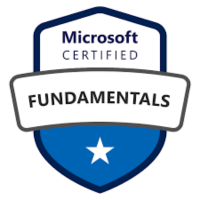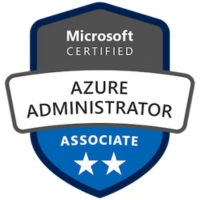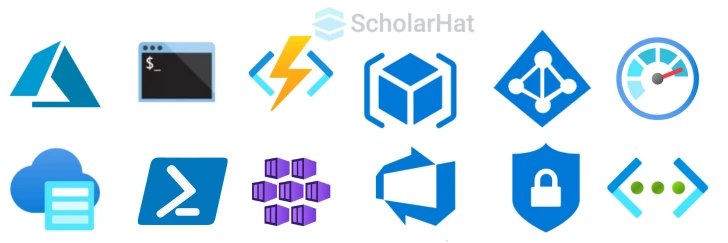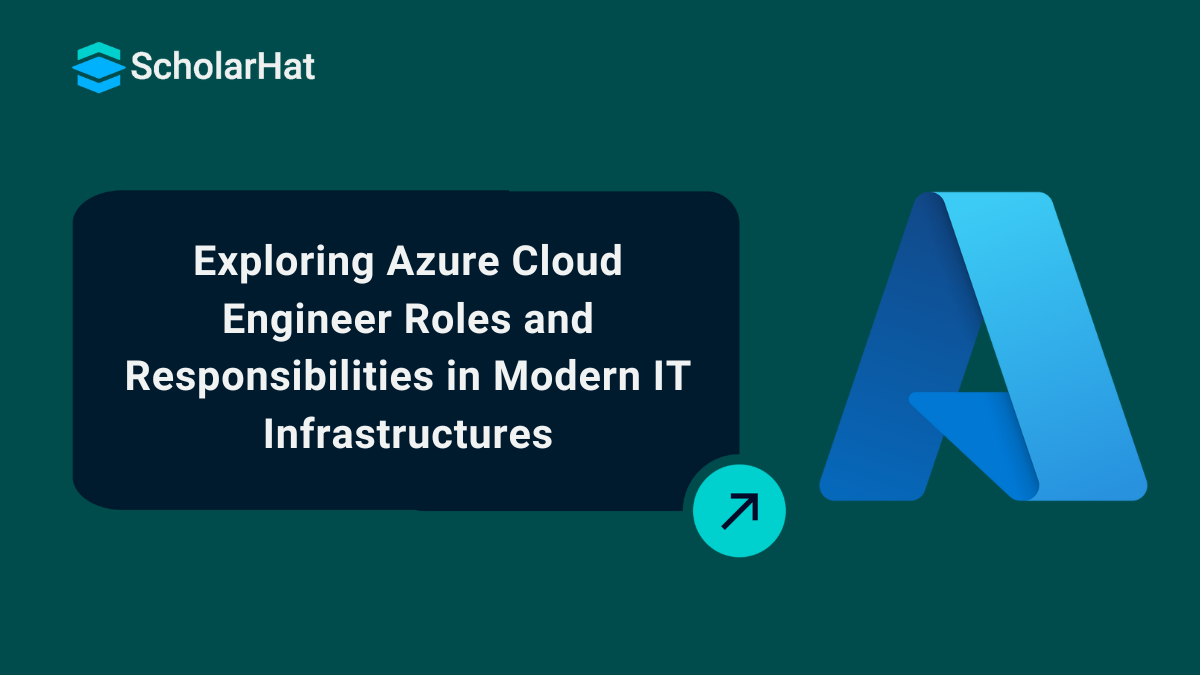18
AprAzure Cloud Engineer Roles and Responsibilities – Skills, Salary & Career Guide
Azure Cloud Engineer is a crucial role responsible for designing, deploying, and managing cloud solutions using Microsoft Azure. This role ensures seamless cloud infrastructure, security, and optimization while enabling businesses to scale efficiently. Azure Cloud Engineers work with various Azure services, automation tools, and best practices to enhance cloud performance and reliability
What is an Azure Cloud Engineer?
An Azure Cloud Engineer is a cloud computing professional who designs, deploys, and manages cloud-based solutions using Microsoft Azure. They ensure the smooth operation of cloud services, optimize infrastructure, and enhance security, scalability, and performance for businesses.
As an Azure Cloud Engineer, you work with:
- Cloud Architecture & Deployment: Designing, implementing, and maintaining cloud environments based on business needs.
- Infrastructure as Code (IaC): Automating resource provisioning using tools like Terraform and Azure Resource Manager (ARM) templates.
- Networking & Security: Managing virtual networks, firewalls, and identity access management (IAM) for secure cloud operations.
- Monitoring & Optimization: Using Azure Monitor, Log Analytics, and Cost Management to track performance and reduce costs.
- DevOps & Automation: Integrating CI/CD pipelines, containers (Docker, Kubernetes), and scripting (PowerShell, Python, or Bash) to improve cloud workflows.
With Azure Cloud Engineering skills, you can build scalable, resilient, and secure cloud solutions, ensuring businesses stay efficient and competitive in the cloud era!
Azure Cloud Engineer Roles and Responsibilities
Cloud computing is transforming IT infrastructure by providing scalability, flexibility, and cost-efficiency. As an Azure Cloud Engineer, you manage cloud environments, ensure security, and optimize performance. But what exactly do you do? Let’s break it down.

The Role of a Cloud Engineer
Do you want to lead the way in designing, implementing, and maintaining cloud-based systems and infrastructure? As a cloud computing engineer, you ensure optimal performance, scalability, and security in cloud environments. You work closely with IT professionals and teams to make sure your organization's cloud setup meets its unique needs and goals.
Azure Cloud Engineers Key Responsibilities
Do you wonder what tasks you'll tackle as a cloud computing engineer? Here are some responsibilities you'll take on:
1.) Designing and Implementing Cloud Solutions
You can design and implement cloud infrastructure that meets your organization's needs. You choose the right cloud computing models like SaaS, IaaS, and PaaS and configure resources to boost performance. Isn't it exciting to build solutions that truly work for your team?
2.) Cloud Infrastructure Management
You can manage and maintain your organization’s cloud environment by overseeing servers, networks, and databases. You monitor performance, troubleshoot issues, and optimize resource allocation to ensure everything runs smoothly. Can you see yourself as the guardian of your company’s digital world?
3.) Application Development and Deployment
You can collaborate with development teams to create and deploy cloud-native applications. You ensure every app is set up to run efficiently on the cloud platform and take advantage of cloud-specific features. Don't you love turning innovative ideas into real-world solutions?
4.) Data Storage and Management
You can handle the storage and management of data in the cloud, keeping it secure and accessible. You implement robust backup and recovery strategies and optimize data retrieval processes. Wouldn't you enjoy being the expert who keeps data safe and readily available?
5.) Security and Compliance
You can play a key role in protecting the cloud environment by enforcing strong security measures. You monitor for potential threats and ensure your setup complies with industry regulations and best practices. Do you feel ready to be the defender of your organization's digital assets?
6.) Collaboration and Communication
You can work hand-in-hand with developers, system administrators, and management to translate business needs into technical solutions. You provide clear guidance on cloud matters, making sure everyone is on the same page. Isn't it rewarding to see your ideas drive success across teams?
| Read More: Cloud Engineer Roadmap |
Skills Required to Become an Azure Cloud Engineer
Becoming an Azure Cloud Engineer requires a combination of technical skills, problem-solving abilities, and a deep understanding of cloud services. You need to know how to design, deploy, and manage cloud infrastructure while ensuring security and efficiency. Let's explore the key skills you need.
1. Expertise in Azure Services
You must have a strong understanding of Azure cloud services to deploy and manage resources efficiently. Azure offers various services for computing, networking, and storage.
- Virtual Machines (VMs): Deploy, configure, and optimize Azure Virtual Machines.
- Azure Networking: Set up virtual networks, load balancers, and VPNs for seamless connectivity.
- Storage Solutions: Manage different Azure storage options, including Blob Storage and Azure SQL Database.
2. Cloud Security and Compliance
Security is a top priority in cloud computing. You need to implement best practices to secure cloud environments and ensure compliance with industry standards.
- Identity and Access Management: Use Azure Active Directory to manage users and permissions.
- Data Protection: Implement encryption, firewalls, and threat detection using Azure Security tools.
- Compliance: Ensure compliance with industry regulations like GDPR and HIPAA.
3. Automation and Scripting
Automation helps streamline processes, improve efficiency, and reduce manual workload. You must be comfortable with scripting and infrastructure automation tools.
- Scripting Languages: Use PowerShell and Python to automate cloud tasks.
- Infrastructure as Code (IaC): Implement IaC using Terraform or Azure Resource Manager (ARM) templates.
| Read More: Automation in Azure |
4. Cloud Monitoring and Optimization
Efficient cloud management requires continuous monitoring and optimization to improve performance and reduce costs.
- Monitoring Tools: Use Azure Monitor and Application Insights to track performance.
- Cost Management: Optimize resource usage and reduce costs using Azure Cost Management.
5. Problem-solving and Troubleshooting
You will face technical challenges while managing cloud environments. Strong troubleshooting skills help resolve issues quickly.
- Incident Management: Follow best practices for handling and resolving cloud incidents.
- Root Cause Analysis: Identify and resolve underlying issues effectively.
6. Communication and Collaboration
Cloud engineers work with multiple teams, including developers, security professionals, and IT operations. Strong communication skills are essential.
- Team Collaboration: Work closely with other teams to implement and optimize cloud solutions.
- Technical Documentation: Create clear documentation to help teams understand cloud configurations.
7. Continuous Learning and Adaptability
Azure constantly evolves with new features and updates. Staying up-to-date is crucial for career growth.
- Stay Updated: Learn about new Azure services and best practices.
- Adaptability: Be ready to adopt new technologies and cloud trends.
Mastering these skills will help you build a successful career as an Azure Cloud Engineer. Ready to take the next step?
How to Become an Azure Cloud Engineer?
Do you want to become an Azure Cloud Engineer? It’s an exciting career with high demand. You need technical skills, hands-on experience, and a willingness to learn. Azure is one of the top cloud platforms, and mastering it will open many job opportunities. Let’s break down the steps you need to follow.
1. Gain Relevant Education
A strong foundation in computer science or IT helps, but you don’t need a degree to start. Learn the basics of cloud computing, networking, and programming. Take online courses that focus on Microsoft Azure and its services.
- Cloud Computing Fundamentals: Understand virtualization, networking, and cloud security.
- Programming Skills: Learn Python, PowerShell, or C# to automate cloud tasks.
- Azure-Specific Training: Explore Microsoft's free and paid training materials.
2. Develop Technical Azure Skills
To work in the cloud, you need to master Azure services and tools. Get hands-on with Azure and practice deploying resources.
- Azure Compute: Learn how to create and manage Virtual Machines and App Services.
- Azure Storage: Understand Blob Storage, SQL Databases, and Azure Files.
- Automation: Use PowerShell, Azure CLI, and ARM templates to automate tasks.
- Networking: Work with Azure Virtual Networks, Load Balancers, and Firewalls.
3. Gain Hands-On Experience
The best way to learn is by doing. Set up an Azure free account and start experimenting. Work on real projects to build your skills.
- Deploy a Website: Use Azure App Services to host a simple web app.
- Set Up a Virtual Machine: Create and configure a VM to understand cloud infrastructure.
- Work on Open-Source Projects: Contribute to GitHub repositories that use Azure.
4. Get Certified in Azure
Certifications prove your skills and help you get noticed by employers. Microsoft offers role-based certifications to validate your knowledge.
- AZ-900 (Azure Fundamentals): Best for beginners to understand cloud concepts.
- AZ-104 (Azure Administrator): Learn how to manage Azure resources.
- AZ-305 (Azure Solutions Architect): Master designing cloud solutions.
5. Build a Portfolio
Showcase your skills with a strong portfolio. Create case studies and projects that highlight your Azure expertise. Employers look for practical experience, so make sure to document your work.
- Include Cloud Projects: Show deployments, automation scripts, and architecture diagrams.
- Use GitHub: Upload your work to demonstrate your coding and cloud skills.
- Write Technical Blogs: Share what you learn on platforms like Medium or LinkedIn.
6. Network with Cloud Professionals
Connecting with other cloud engineers can open job opportunities. Join communities, attend events, and engage in discussions.
- Join Online Forums: Engage in Azure discussions on Reddit, Stack Overflow, and LinkedIn.
- Attend Cloud Meetups: Participate in Azure community events and hackathons.
- Follow Industry Leaders: Learn from Microsoft-certified professionals.
7. Stay Updated and Keep Learning
Azure is always evolving. Keep up with the latest updates and best practices.
- Follow Azure Blogs: Read Microsoft’s official blog for updates.
- Take Advanced Courses: Learn new skills like Kubernetes and DevOps.
- Experiment with New Features: Test upcoming Azure services before they become mainstream.
By following these steps, you can become an Azure Cloud Engineer. It takes dedication, but with the right skills and experience, you can build a successful career in cloud computing.
Azure Cloud Engineer Salary & Career Path
Are you thinking about becoming an Azure Cloud Engineer? It’s a great career choice with high demand and excellent salary packages. Your earnings depend on your experience, skills, and location. Let’s explore the salary structure and career growth in this role.
1. Salary Based on Experience
Your salary as an Azure Cloud Engineer increases as you gain experience. Here’s a breakdown of the average salary based on experience:
| Experience | Average Salary (India) | Average Salary (Worldwide) |
| Fresher (<1 year) | ₹ 6 - 10 LPA | $60,000 - $80,000 per year |
| Mid-Level (3-7 years) | ₹ 12 - 20 LPA | $80,000 - $120,000 per year |
| Senior (>7 years) | ₹ 25 - 40 LPA | $120,000 - $180,000 per year |
2. Salary Based on Location
Your location plays a big role in how much you earn. Here’s a look at the average salary in different cities and countries:
| City / Country | Average Salary |
| Bangalore (India) | ₹ 20 - 30 LPA |
| Hyderabad (India) | ₹ 18 - 28 LPA |
| Pune (India) | ₹ 15 - 25 LPA |
| United States | $90,000 - $150,000 per year |
| United Kingdom | £50,000 - £100,000 per year |
| Canada | CAD 70,000 - CAD 130,000 per year |

3. Skills That Boost Your Salary
Want to increase your earning potential? Focus on these in-demand Azure skills:
- Cloud Platforms: Microsoft Azure, AWS, Google Cloud
- Infrastructure as Code: Terraform, ARM Templates
- DevOps & Automation: Azure DevOps, Kubernetes, Docker, PowerShell
- Networking & Security: Virtual Networks, Firewalls, Identity & Access Management
- Databases & Storage: Azure SQL, Cosmos DB, Blob Storage
| Read More: AWS vs. Azure vs. Google Cloud |
4. Azure Cloud Engineer Career Path
As an Azure Cloud Engineer, your career can progress based on your skills, certifications, and hands-on experience. Here’s how you can grow in this field:
- Learn Azure Basics: Start with Microsoft Azure Fundamentals
- Get Certified: Earn an Azure Administrator Associate or Azure Solutions Architect certification
- Gain Hands-on Experience: Work on real-world Azure projects
- Join the Azure Community: Participate in forums, events, and hackathons
- Apply for Jobs: Look for entry-level cloud roles and grow from there
Career Progression
Your journey as an Azure Cloud Engineer follows a structured path. As you gain more experience and expertise, you can move into higher-level roles:
| Career Level | Job Title |
| Entry Level | Azure Cloud Engineer |
| Mid-Level | Azure Solutions Architect / Cloud Administrator |
| Senior Level | Azure Cloud Consultant / DevOps Engineer |
| Leadership | Cloud Architect / Chief Cloud Officer |
Azure Cloud Engineer Certifications
Are you looking to advance your career in cloud computing? Getting certified as an Azure Cloud Engineer can make a big difference. Azure certifications help you demonstrate your expertise in working with Azure cloud technologies and managing cloud resources effectively.
Azure offers several certifications that suit different levels of experience. Here’s a quick look at some of the key certifications:
Microsoft Certified: Azure Fundamentals (AZ-900)

Azure Fundamentals (AZ-900) - This is a great starting point if you’re new to cloud computing. It covers basic concepts such as cloud computing, Azure services, and core cloud principles. Why not start with the basics and build your confidence?
Microsoft Certified: Azure Administrator Associate (AZ-104)

Azure Administrator Associate (AZ-104) - If you want to manage Azure subscriptions, implement virtual networks, and secure identities, this certification is for you. It’s ideal for those who want to become proficient in day-to-day Azure administration tasks.
Microsoft Certified: Azure Developer Associate (AZ-204)

Azure Developer Associate (AZ-204) - Are you passionate about developing cloud applications? This certification dives into creating and deploying cloud applications, APIs, Azure storage, and much more. It’s perfect if you want to build scalable and efficient applications on Azure.
Microsoft Certified: Azure Solutions Architect Expert (AZ-305)

Azure Solutions Architect Expert (AZ-305) - For those of you who want to design complex solutions on Azure, this advanced-level certification is the way to go. It covers everything from infrastructure design to security implementation.
Microsoft Certified: Azure AI Engineer Associate (AI-102)

Azure AI Engineer Associate (AI-102) - Interested in artificial intelligence? This certification focuses on creating AI solutions using Azure’s machine learning and cognitive services. It’s a great fit for anyone aiming to specialize in AI on the cloud.
Microsoft Certified: Azure DevOps Engineer Expert (AZ-400)

Azure DevOps Engineer Expert (AZ-400) - If you’re looking to bridge development and IT operations, this certification is made for you. It focuses on continuous integration, delivery, and infrastructure as code. Can you imagine being the go-to expert for both developers and IT teams?
So, which certification is right for you? It depends on your career goals and interests. Whether you’re just starting out or aiming to specialize, these certifications can set you apart in the fast-growing field of cloud engineering.
By getting certified, you don’t just gain knowledge – you improve your job prospects, boost your earning potential, and open doors to new opportunities. So, are you ready to take the next step in your career?
Tools and Technologies Used by Azure Cloud Engineers

As an Azure Cloud Engineer, you will rely on a variety of tools and technologies to manage, deploy, and monitor cloud applications and infrastructure. These tools help you maintain productivity, secure your resources, and optimize your cloud environment. Let’s take a look at some of the essential tools you’ll be using:
- Azure Portal: This is your go-to interface for managing Azure resources. With a user-friendly dashboard, you can easily manage services, monitor resource health, and deploy new resources. You’ll spend a lot of time here!
- Azure CLI: The Azure Command-Line Interface allows you to interact with your resources using commands. If you prefer working with the terminal or scripting, this tool makes automation and management easier.
- Azure PowerShell: For those who prefer PowerShell, this set of cmdlets is perfect. It integrates deeply with Azure, allowing you to automate tasks and manage resources effectively. It’s your friend when dealing with complex scripts.
- Azure Resource Manager (ARM): With ARM, you manage your Azure resources through templates. It enables Infrastructure as Code (IaC), which means you can automate and streamline the deployment of your environments.
- Azure DevOps: If you want to automate the software development lifecycle, Azure DevOps is your solution. From planning to testing and deployment, it helps you manage CI/CD pipelines, version control, and release management seamlessly.
- Azure Monitor: Monitoring is key to keeping your cloud environment running smoothly. AzureMonitor provides real-time insights into the performance, health, and usage of your resources so you can keep everything in check.
- Azure Security Center: Security is always top of mind, and Azure Security Center offers unified security management. It helps you with threat protection, security alerts, and recommendations to keep your resources secure.
- Azure Active Directory (AAD): Azure Active Directory is a must for managing identities and access. With features like single sign-on (SSO), multi-factor authentication (MFA), and conditional access policies, it helps you control who can access what.
- Azure Storage Services: You’ll be using tools like Azure Blob Storage, Disk Storage, and File Storage to store and manage data in the cloud. Whether you're working with files, disks, or data blobs, Azure’s storage solutions have you covered.
- Azure Kubernetes Service (AKS): If you're dealing with containerized applications, Azure Kubernetes Service (AKS) will be a key tool for orchestrating your containers. It simplifies deployment and management, ensuring your applications scale effectively.
- Azure Functions: This serverless computing service is perfect for event-driven applications. With Azure Functions, you can run your code without worrying about server management, making it highly efficient for small applications.
- Azure Networking Tools: Setting up networking solutions like Azure Load Balancer, Virtual Network (VNet), and Application Gateway ensures secure, high-availability communication between Azure services. These tools are essential for managing your cloud’s network architecture.
So, which tool are you excited to use? With all these powerful options, you can manage, optimize, and secure your Azure environment like a pro!
Summary
Azure Cloud Engineers play a crucial role in managing, deploying, and securing cloud-based applications and infrastructure. They work with a variety of tools like Azure Portal, CLI, PowerShell, and Azure DevOps to automate processes and maintain cloud environments. Their responsibilities include monitoring performance, managing security, and optimizing resources to ensure smooth cloud operations.
Interested in leveling up your Azure skills? Check out these certifications and courses:
- Microsoft Azure Certification Training
- Microsoft Azure Solution Architect Certification
- Free Azure Fundamentals Course
Enhance your expertise and take your career to the next level with these top-rated Azure training resources!
Did You Know? Quiz - Azure Cloud Engineer Roles and Responsibilities
Q1: "An Azure Cloud Engineer is responsible for implementing, managing, and monitoring cloud infrastructure and services on the Azure platform."
- True
- False
Q2: "Azure Cloud Engineers are primarily responsible for writing code for cloud applications and software development."
- True
- False
Q3: "Azure Cloud Engineers are responsible for automating cloud processes and implementing security measures for cloud environments."
- True
- False
Q4: "One of the roles of an Azure Cloud Engineer is to manage databases and ensure proper backup and recovery strategies for cloud services."
- True
- False
Q5: "Azure Cloud Engineers do not need to monitor cloud resource usage or optimize costs for cloud environments."
- True
- False
FAQs
Take our Azure skill challenge to evaluate yourself!

In less than 5 minutes, with our skill challenge, you can identify your knowledge gaps and strengths in a given skill.








